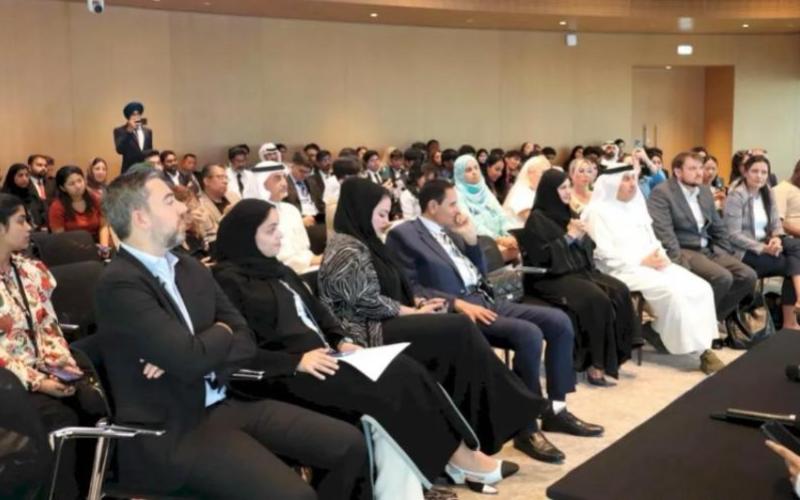EEG’s 2nd Panel Discussion 2025: “Food Security in West Asia: Overcoming Challenges & Unlocking Innovations for a Sustainable Future”

The event was made possible with the generous support of McDonald’s UAE & Accenture, who have continually shown their commitment to advancing sustainability initiatives in the UAE. The event also benefited fr om the support of Al Khoory Hotel, who served as the caterer, and EEG’s Panel Discussions Partner, Arabia CSR Network, along with other esteemed collaborators including the Emirates Green Building Council, Clean Energy Business Council and the Swiss Business Council.
The day’s discussions began with an engaging Inter-School Debate, wh ere students from Delhi Private School, Sharjah and Al Sadiq School, Dubai passionately debated the future of food security in West Asia. The team fr om Delhi Private School argued that “West Asia will attain full food security,” while Al Sadiq School emphasised that “West Asia will continue to struggle with food security challenges.” This lively exchange of ideas highlighted the complexities of the issue and showcased the remarkable ability of young minds to engage in critical thinking and propose innovative solutions.
The panel discussion, following the debate, featured a distinguished line-up of experts, each contributing unique insights into the multifaceted challenges surrounding food security in the region. Professor Aly El Kabalawy from the University of Sharjah’s College of Sciences provided an academic perspective on the biological and scientific aspects of food security in arid climates. Ms. Maryam Al Mualla, Associate Project Manager at the UAE Ministry of Economy, explored the role of government policy and regulation in ensuring sustainable food systems. While Mr. Yazen Al Kodmani, General Manager of Emirates Bio Farm, shared practical examples of how innovative farming practices are transforming agriculture in the UAE. Additionally, Mr. Sergei Kiselev, Head of Research and Development at Al Ain Farms, highlighted how innovation and technology are being applied in large-scale dairy and livestock production to boost national food resilience.
The discussion delved into the most significant challenges facing the region, including climate change, water scarcity and geopolitical instability. Panelists explored both immediate and long-term strategies needed to ensure food security, emphasising the critical importance of regional cooperation, innovative policies and technological advancements.
The event highlighted the potential for AI-driven agriculture, controlled-environment farming, and digital technologies to enhance productivity and ensure equitable access to food in the region. Moreover, experts called for robust collaboration among governments, private sectors and academia to overcome the obstacles impeding food security.
“It was an honour to bring together such a distinguished group of thought leaders and innovators to address the urgent issue of food security in West Asia,” said Mrs. Habiba Al Mar’ashi, Co-Founder & Chairperson of EEG. “The conversation during panel discussion was a vital step towards mobilising actionable solutions to ensure sustainable and resilient food systems in the region. Our collective efforts, grounded in innovation and collaboration, are key to overcoming the challenges we face.”
The panel discussion brought critical issues to light and also ignited the conversation around actionable steps that can be taken to safeguard food security for future generations. EEG remains committed to driving forward this important dialogue and fostering collaboration across sectors to support the achievement of the Sustainable Development Goals (SDGs), particularly SDG #2 (Zero Hunger), SDG #6 (Clean Water and Sanitation) and SDG #13 (Climate Action).
As part of its ongoing educational initiatives, EEG continues to engage the younger generation through initiatives such as the newly introduced Inter-School Debate, which empowers students to think critically about sustainability challenges and solutions. By fostering a new generation of environmentally conscious leaders, EEG is laying the groundwork for a sustainable future wh ere food security in West Asia is not just a vision but a reality.
Emirates Environmental Group (EEG) is a professional working group established in 1991 in the United Arab Emirates. It is devoted to protecting the environment through the means of education, action programmes and community involvement. EEG is actively encouraged and supported by concerned local and federal government agencies. It is the 1st environmental NGO in the world to be ISO 14001 certified and the only organisation of its kind in the UAE with accredited status to the United Nations Convention to Combat Desertification (UNCCD) and the UN Environment Programme (UNEP).
EEG is a member of the UN Global Compact, the Global Urban Development (GUD) and the Global Investors for Sustainable Alliance (GISD). It is also a member of the One Planet Network under the programme of Sustainable Food Systems (SFS) and its Multi-Stakeholder Advisory Committee (MAC) and Global Partnership on Marine Litter (GPML), EEG is a full Member (voting) of World Packaging Organisation (WPO).











